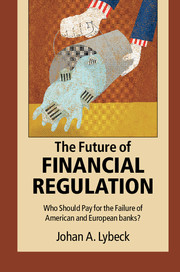Book contents
- Frontmatter
- Dedication
- Contents
- List of figures
- List of tables
- List of boxes
- Preface
- Acknowledgements
- List of abbreviations
- Introduction
- Part I A chronological presentation of crisis events January 2007 – December 2014
- Part II Bail-out and/or bail-in of banks in Europe: a country-by-country event study on those European countries which did not receive outside support
- Part III Bail-out and/or bail-in of banks in Europe: a country-by-country event study on those European countries which received IMF/EU support
- Part IV The TARP program and the bailing out (and bailing in) of US banks
- Part V Summary of the micro studies
- Part VI Political and regulatory responses to the crisis: to bail out or to bail in, that's the question
- Conclusion: toward host-country supervision and resolution?
- Addendum
- Bibliography
- Index
Introduction
Published online by Cambridge University Press: 05 February 2016
- Frontmatter
- Dedication
- Contents
- List of figures
- List of tables
- List of boxes
- Preface
- Acknowledgements
- List of abbreviations
- Introduction
- Part I A chronological presentation of crisis events January 2007 – December 2014
- Part II Bail-out and/or bail-in of banks in Europe: a country-by-country event study on those European countries which did not receive outside support
- Part III Bail-out and/or bail-in of banks in Europe: a country-by-country event study on those European countries which received IMF/EU support
- Part IV The TARP program and the bailing out (and bailing in) of US banks
- Part V Summary of the micro studies
- Part VI Political and regulatory responses to the crisis: to bail out or to bail in, that's the question
- Conclusion: toward host-country supervision and resolution?
- Addendum
- Bibliography
- Index
Summary
Because of this reform, the American people will never again be asked to foot the bill for Wall Street's mistakes. There will be no more taxpayer-funded bailouts – period.
President Barack Obama, 21 July 2010(a) Liquidation required
All financial companies put into receivership under this subchapter shall be liquidated. No taxpayer funds shall be used to prevent the liquidation of any financial company under this subchapter.
(b) Recovery of funds
All funds expended in the liquidation of a financial company under this subchapter shall be recovered from the disposition of assets of such financial company, or shall be the responsibility of the financial sector, through assessments.
(c)No losses to taxpayers
Taxpayers shall bear no losses from the exercise of any authority under this subchapter.
Dodd–Frank Wall Street Reform and Consumer Protection Act of 2010, H.R. 4173, Title 1, chapter 53, subchapter II, § 5394
We worked hard to make sure taxpayer bailouts are completely prohibited. I think the language is very tight on that. One of the things that frustrate me with critics of Title II is that they perpetuate the myth of Too Big To Fail by insisting that the government is still going to do bailouts, notwithstanding clear language in Dodd–Frank to the contrary. And that just continues the moral hazard by reinforcing market perceptions that the big institutions won’t be allowed to fail.
Sheila Bair, former chairman of the FDIC, interview in the Washington Post, 18 May 2013The capital requirements on banks must be set to ensure that the need for the exceptional support of Governments is never again required.
Ireland's former Taoiseach (prime minister) Brian Cowen in a speech on 21 March 2012 at Georgetown UniversityThe financial crisis highlighted that public authorities are ill-equipped to deal with ailing banks operating in today's global markets. In order to maintain essential financial services for citizens and businesses, governments have had to inject public money into banks and issue guarantees on an unprecedented scale: between October 2008 and October 2011, the European Commission approved €4.5 trillion (equivalent to 37% of EU GDP) of state aid measures to financial institutions. This averted massive banking failure and economic disruption, but has burdened taxpayers with deteriorating public finances and failed to settle the question of how to deal with large cross-border banks in trouble.
[…]
- Type
- Chapter
- Information
- The Future of Financial RegulationWho Should Pay for the Failure of American and European Banks?, pp. xxv - xxxviPublisher: Cambridge University PressPrint publication year: 2016



